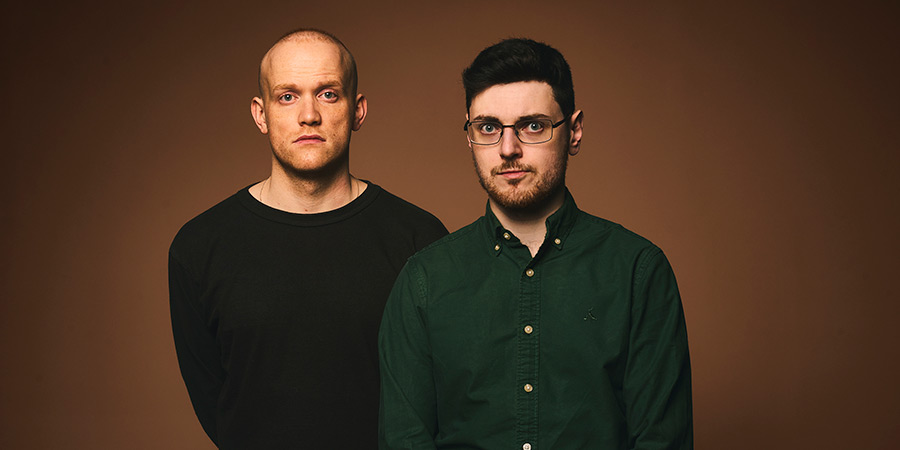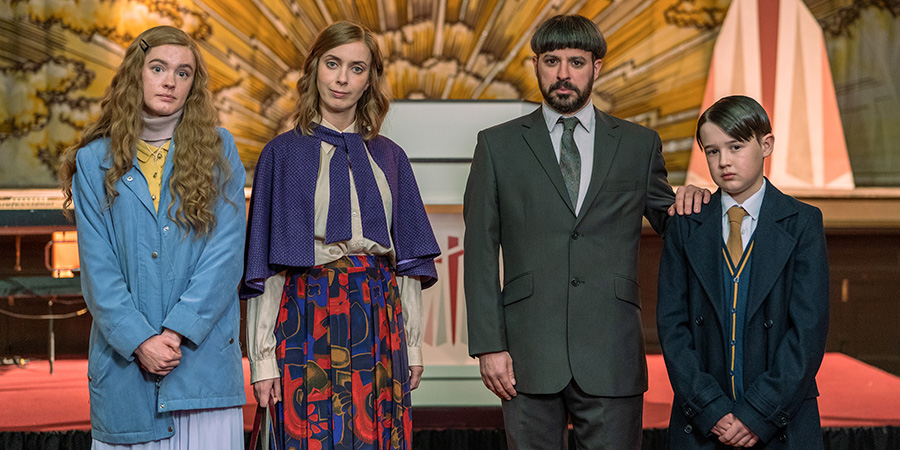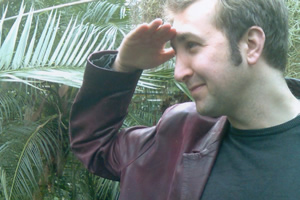Everyone Else Burns creators Dillon Mapletoft and Oliver Taylor talk comedy writing

Dillon Mapletoft and Oliver Taylor are the writers and creators of Channel 4's doomsday cult sitcom Everyone Else Burns, starring Simon Bird, Kate O'Flynn, Amy James-Kelly and Harry Connor.
The pair began writing and appearing on stage together while studying at Cambridge University. In 2017 they first performed the play Fix My Brain, based on Mapletoft's experience of depression and medical student Oliver's experience of living with someone with depression. After several Radio 4 credits, the pair are now developing a number of television projects.
Following on from British Comedy Guide's interview with them, in this BCG Pro interview they discuss working with Armando Iannucci, disassociating from John Cleese and risking death in the name of their art.
You were in Cambridge Footlights. Has that been viewed positively or negatively in the television industry?
Mapletoft: The main opportunity it's given us was that as students we were getting to perform an hour of new material every two weeks to an audience. And that's incredible. Even though it's a certain kind of humour and a lot of what you're doing is pull back reveals to a crowd of drunk students, it's still amazing to have that kind of regular rigour pushing you to produce that, producing stuff on the fly and adapting. Ever since we left uni though, it's not something that we've been putting on our flyers or anything like that. It's something we're keen to move away from because of say, John Cleese doing his GB News show. Oh my God, that's not something we want to be associated with in any way.
Ultimately, Footlights feels like somewhere for comedy keenos at the uni to meet each other and write. I'll always be grateful because I met Oil there. But we've been writing together for seven or eight years now. That chapter feels closed.
How would you describe your writing relationship?
Taylor: This is the one Dillon could really disagree with. But let's just have him listen for a bit and see what he has to say. We have a great deal in common, we're very good at cutting through each other's alternate gags and picking the best ones. We usually come to the same decision about that.
We also have some really different approaches, in particular towards structure. I tend to have a more architectural approach, Dillon likes to feel things out more. You'd be amazed how often when we're taking those different approaches that we come to the same conclusions. Our work schedule means that we're very, very lucky to be in the same room. That happens staggeringly rarely but we fight for it as often as we can. We outline our stuff together and then we divvy up scenes. But if there's a scene we really love, we'll always insist on writing it together. It's more fun to write gags together, to riff off each other and to laugh in a room. Writing can be one of the most solitary activities in the world and we're a lot more productive when we do it together.
Do you agree Dillon?
Mapletoft: Totally. If we occasionally do have a disagreement on something, we might argue about it for an hour and then realise that we're basically saying the same thing. It's just a different way of framing it and I feel like they're mutually complimentary. Because sometimes, if my approach is more abstract, having Oli come in and be like, "OK, we need to structure this more, where exactly are you aiming for a laugh here?" is really, really useful. And I think it works the same the other way around. We both really agree on what's funny but we have different perspectives on how to get there. And thankfully, when there's conflict, it's productive. So I feel we're very fortunate because there are definitely writing partnerships that are a lot more fractious when that happens.

We see that you're adapting your stage show Fix My Brain for television. That seemed a very personal, intimate project to be working on together. So you're basically friends first and foremost and it's not all going to all implode over the odd disagreement?
Mapletoft: That's a great example, in that we first wrote it seven years ago or something. We knew we wanted to do a show together. And we were probably talking about slightly wacky, zany student premises. And then I just sort of opened up to Oli about what was going on with me. And out of that grew this comedy show. And the best part was that I didn't have to pay for a therapist, you [Taylor] just therapised me on stage.
Taylor: Yeah, you were having a difficult experience at the time. And I was approaching similar issues but through the very medicalised, logical lens of being a doctor. And when we were talking about that, we could risk gags on the fly. That's how we know we've got something we're excited to write about. Because suddenly those ideas start flowing in a way that's not easy, it still requires a lot of work and commitment. But we're just on the same page.
I have to ask Dillon, what was it like working as a writer's assistant for Armando Iannucci on Avenue 5?
Mapletoft: It was obviously an incredible experience, three and a half years of my life. It was extremely labour intensive, not because Armando is excessively demanding, just because his universe is so big and that team is so big. It was getting up at 5.30am and getting back at 9pm. Napping in my lunch break. But it was amazing to be in a room with people who've worked on Veep and these Emmy winners. Seeing that process of taking a script and really honing in on the dialogue. It's a niche thing to reference but I hadn't known that "ALTS" were a thing, like alternate lines that you just format into a script. You write 10 gags and then you scythe through them. Seeing the team do that and produce that has definitely helped me with my writing in terms of, if I'm stuck on something, I'll write 10 versions of it, send it to Oli and he'll do a cut down.
And it's just generally demystifying, to see the cogs working and the amount of labour required to produce something funny. Even though we've written together a lot, I can still feel kind of useless if I can't think of a good joke. So to be in a room with Emmy winners and to realise that there are also occasionally five minute silences where no-one can come up with anything, is great.
But it's a very different environment to our show because there was a writing staff of 24 writers at one point on Avenue 5 I think, huge budget, all studio set. Everyone Else Burns was just the two of us, it was all on location, it was literally grounded on Earth as opposed to being in space. I'm very grateful for that training. But I'm so pleased to be doing my own thing.
Do you find writing in a writers' room markedly different to the two of you writing alone?
Mapletoft: From my experience, all writers rooms are run differently with some more hierarchical than others. But in a writers' room, I'm certainly more aware that the showrunner is going to be vetting everything. So you're wanting to produce something more in their voice or that they go for. Whereas, when we were writing [Everyone Else Burns], we were given so much support for our vision. That's kind of the dream really because you start with nothing off the table. And being best friends as well as colleagues, I know I can pitch all kinds of bad dialogue early and he won't judge me and stop working with me. Whereas in a writers' room, if I'm in doubt I'll stay silent because you don't want that moment of saying something and it falling like a lead balloon.
And Oli, have you left the medical profession behind? Or are you keeping your hand in?
Taylor: I relinquished my medical licence about four weeks ago. It's still possible for me to return but it's not something I especially want to do. I saw how so many people were so excited, committed and prepared to give so much of themselves to that world. And I gradually realised, over three or four years, that that wasn't what I wanted. I had this other passion that I was committed to, another way of contributing to the world.

Finally, what else are you working on? Will you be returning to performing or are you more committed to writing?
Mapletoft: I think we really want to write. Oli has more self-confidence but I'm cripplingly anxious by default. The way I reassure myself is by trying to work as hard as possible and keep improving. It's so amazing to have this show coming out and I just want to get sharper and better at it. That's not to say performing isn't fun, performing with Oli is the best thing ever. But it's not really something we've thought about for years. It was great for me to do a little cameo [in Everyone Else Burns] but it's not something we're focusing on. If someone gets in touch and says 'the way you told Amy James-Kelly to fuck off was just incredible, you're my leading man', I'm never going to say never. But I think it's writing all the way, for now at least. Don't let me speak for you though Oli...
Taylor: I think Dillon's great at performing. If a window opened up in the future in a natural way, I'm sure it's something I'd enjoy doing and there's a good chance it's something Dillon would enjoy doing as well. If he was honest with himself and I pushed him in the right direction. We're so thrilled to have this opportunity now that writing absolutely is our focus. But when we're riffing together, it is performance, we're using our knowledge of what gets a laugh in a room from back when we were student comedians and we love each other's gags. So the performing side is tied to the writing, even when we are behind the camera or just putting together the script.
Mapletoft: Also, I can't really talk about the cast enough. When you see someone like Lolly [Adefope] for example doing dialogue we've written, you just think, "how great is it to have you doing our lines?" That feeling is incredible. And so much better than anything I experienced performing. I'm thinking of this time we did a show in Brighton in a tiny shipping container, water started leaking over the one light bulb over the stage. And we had to confront it mid-performance and try to reassure the audience that if anyone was going to get shocked, it would be us, because they were on plastic seats.
Taylor: It felt like, if this is how we die, is this a good death?
Mapletoft: It didn't feel like it would be a noble death, no.
This article is provided for free as part of BCG Pro.
Subscribe now for exclusive features, insight, learning materials, opportunities and other services for comedy creators.


